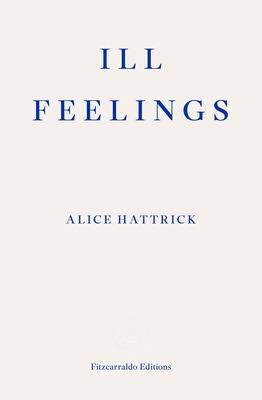Ill Feelings
Alice Hattrick
(Fitzcarraldo Editions 2021) pbk £12.99
I have always been like her, and for most of her life, she has felt ill.
In her debut book, Hattrick addresses with gusto the poorly understood condition of ME/CFS with which both she and her mother live. Her title plays on the ambiguities relating to this ‘medically unexplained’ illness, whose very labelling continues to be contentious and divisive. Hattrick unpacks the ways sufferers feel ill, but also the feelings they have about being ill and about the attitude of others towards CFS. Often this is an undisguised scepticism since frequently there is no visible ailment or disability. The medical profession(s) and their misguided attempts to ‘cure’ CFS come in for particular Hattrick stick. ME (Myalgic encephalomyelitis) was re-named Chronic Fatigue Syndrome in the absence, to date, of an identifiable causal pathology and because, although symptoms are wide ranging, fatigue is the major and most limiting characteristic, experienced in both body and mind.
Diagnosed as a child and now 34 she is still angry — ‘basically furious’, is her repeated rift. Hattrick talks movingly about feeling ill as a child and living within a cloud of confusions. Undermining statements were repeatedly made that she and her mother ’shared a hysterical language’….. ’My mother’s illness and my own ill feelings were inexplicably intertwined’. Her childhood passed within the illness time frame of her mother, of whose years, ‘five….[were] spent in her bedroom in the dark followed by ten years of carers in and out most days.’ At 11 she was sent to a funded boarding school where she felt ill and alone and where others thought she was faking it.
Hattrick interlaces memoir with snippets of other women’s lives whose historical courses were determined too by unexplained illness, including Alice James, Elizabeth Barret Browning, Virginia Woolf and Florence Nightingale. Her mother apparently started referring to her own condition as ‘the vapours’. She delivers an extensively researched summary on the history of CFS and its different models of treatment; this includes the social, employment, economic and political implications of this polarising condition. Towards the end of her extended essay she makes links between her own health questions and those currently posed by Long Covid, as the latest bundle of unexplained symptoms to appear, potentially affecting a sizeable percentage of the previously able -bodied workforce.
Hattrick’s position in the CFS debate is partisan. Other stakeholders argue that sufferers can and do derive benefit from research and treatments issuing from it. And it wasn’t just Alice James who had poorly understood symptoms, they ran amok in the entire family. Her brothers Henry, novelist of complexity, and medic/ pioneer psychologist William wrote lengthy correspondence to each other about them, unmentioned here. William’s career, interspersed with episodes of debilitating unexplained symptoms, was dedicated to his attempt to understand the relationship between subjective emotion and physiology. Hattrick does not talk about relationships or about what and who she draws from as a personal resource. There is little exploration of the interaction of her body-mind with her particular family circumstances and the formative people around her as a child.
The book, certainly, is a testament to the unarguable complexity of health and its blend of the personal and the political. She ends with a form of personal manifesto which may well resonate with others of similar experience. Hattrick was never going to arrive at a neat resolution of her health dilemma; instead she is fashioning a new relationship with it, one of un-recovery, orientating her own future towards ‘crip’ time, a term new to me. Like ‘queer’, a previously derogatory term (abbreviated from cripple) is being reclaimed by theory now from within Dis-ability Studies and communities, as one of positive value. Different from ‘able-bodied’ time and its ‘neo-liberal’ assumptions, Harrick is affirming the kind she wants to live in, in pain as well as joy, in which people with invisible, non- normative body-mind conditions can live in personally meaningful ways:
I am claiming my self- worth.
Bernadette Ashby


Leave a Reply